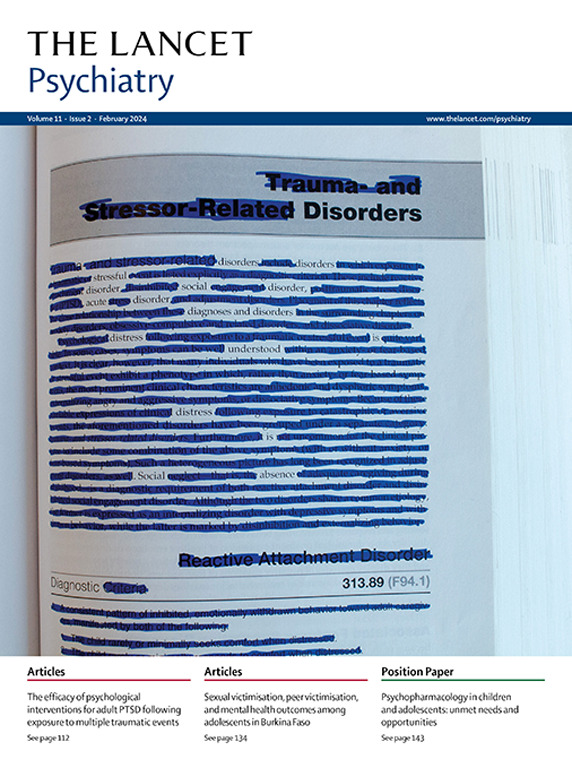Absolute neutrophil count and adverse drug reaction monitoring during clozapine treatment: consensus guidelines from a global Delphi panel
IF 30.8
1区 医学
Q1 PSYCHIATRY
引用次数: 0
Abstract
Despite its superior effectiveness for treatment-resistant schizophrenia, clozapine has a high burden of adverse drug reactions (ADRs), which require monitoring and treatment. This global Delphi study has established consensus guidelines for absolute neutrophil count (ANC) thresholds for consideration of clozapine cessation and provided monitoring protocols for ADR management. Recommendations include lowering ANC cessation thresholds to 1·0 × 109 cells per L (0·5 × 109 cells per L for Duffy antigen receptor for chemokines-null individuals) and discontinuing routine ANC monitoring after 2 years. Comprehensive ADR monitoring every 3 months should address the metabolic syndrome, constipation, gastro-oesophageal reflux, sialorrhea, nocturnal enuresis, tachycardia, sleep apnoea, sedation, and other ADRs. Consumer representatives underscored the need for shared decision-making, streamlined monitoring, and accessible patient education. Although barriers persist, these findings support updating global policies to reduce burden on patients, enhance adherence, and optimise clinical outcomes. Incorporating evidence-based guidelines into practice could transform clozapine care, balancing safety with practicality to improve the lives of those with treatment-resistant schizophrenia.绝对中性粒细胞计数和氯氮平治疗期间的药物不良反应监测:来自全球德尔菲小组的共识指南
尽管氯氮平在治疗难治性精神分裂症方面具有卓越的疗效,但它也有很高的药物不良反应负担,需要监测和治疗。这项全球德尔福研究建立了绝对中性粒细胞计数(ANC)阈值的共识指南,用于考虑氯氮平的停止,并提供了不良反应管理的监测方案。建议包括将ANC停止阈值降低至1.0 × 109细胞/ L(无趋化因子的Duffy抗原受体为0.5 × 109细胞/ L),并在2年后停止常规ANC监测。每3个月进行一次全面的不良反应监测,针对代谢综合征、便秘、胃食管反流、唾液漏、夜间遗尿、心动过速、睡眠呼吸暂停、镇静等不良反应。消费者代表强调了共同决策、简化监测和方便患者教育的必要性。尽管障碍仍然存在,但这些发现支持更新全球政策,以减轻患者负担,提高依从性,并优化临床结果。将循证指南纳入实践可以改变氯氮平治疗,平衡安全性和实用性,以改善治疗难治性精神分裂症患者的生活。
本文章由计算机程序翻译,如有差异,请以英文原文为准。
求助全文
约1分钟内获得全文
求助全文
来源期刊

Lancet Psychiatry
PSYCHIATRY-
CiteScore
58.30
自引率
0.90%
发文量
0
期刊介绍:
The Lancet Psychiatry is a globally renowned and trusted resource for groundbreaking research in the field of psychiatry. We specialize in publishing original studies that contribute to transforming and shedding light on important aspects of psychiatric practice. Our comprehensive coverage extends to diverse topics including psychopharmacology, psychotherapy, and psychosocial approaches that address psychiatric disorders throughout the lifespan. We aim to channel innovative treatments and examine the biological research that forms the foundation of such advancements. Our journal also explores novel service delivery methods and promotes fresh perspectives on mental illness, emphasizing the significant contributions of social psychiatry.
 求助内容:
求助内容: 应助结果提醒方式:
应助结果提醒方式:


